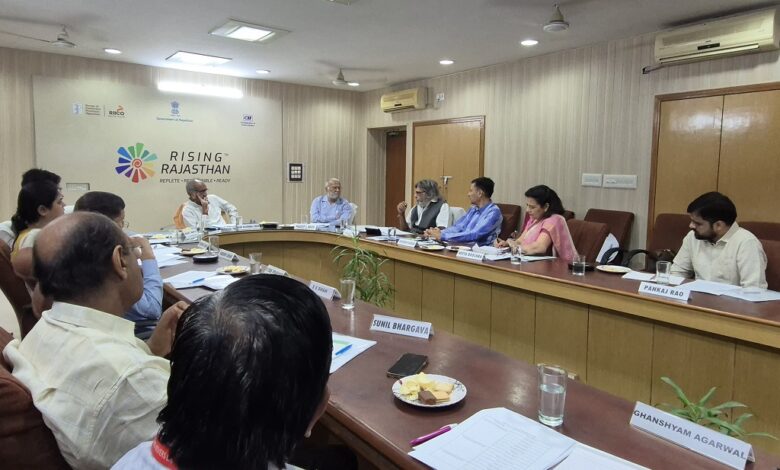
New Delhi, 17th April 2025: At the Advisory Committee meeting of the Rajasthan Employment, Manufacturing, Investment and Trade (REMIT) project, it was proposed that CUTS International will submit a memorandum to the Government of Rajasthan, with sector-wise analysis of revenue generation potential in the state. The aim is to boost state revenue by identifying and harnessing high-potential sectors to attract increased investments into Rajasthan and thus reduce the deficit in the state and also boost employment.
This initiative is expected to offer a fresh perspective that can complement and strengthen the government’s ongoing efforts to drive sustainable economic growth. The meeting held under the Chairmanship of Rao Rajendra Singh, MP witnessed active participation and valuable insights from experts across sectors. The presence of senior officials from the Department of Industries and Commerce, Government of Rajasthan, would have further benefited them and the discussions.
Carrying forward the wheel from the last advisory meeting held on 6th January, 2025, under the chairmanship of Shri Sunil Arora, former Chief Election Commissioner and Chairman, RIICO, this meeting aimed at defining the immediate clear actionable roadmap for the project after taking on board various movements in the state and the project. Members emphasised that by adopting a human-centric approach, fostering effective public-private partnerships, and fixing the issue of bureaucratic instability and transfers with right attitude, Rajasthan can unlock its untapped potential and position itself as a frontrunner in the vision of Viksit Bharat.
In his opening remarks, Pradeep S. Mehta, Secretary General of CUTS International and Convenor of the REMIT Project, emphasised that lack of administrative continuity remains a key barrier to effective delivery, with officers often working under uncertain tenures and “carrying transfer orders in their pocket.” He pointed out that frequent reshuffling in the Industries Department—particularly at RIICO, which had four Managing Directors in a single year—illustrates this concern.
“This practice violates Supreme Court’s directions issued in October 2013 to fix reasonable tenures” in a matter raised by former Cabinet Secretary, T S R Subramaniam vs Union of India. Paradoxically, the future Cabinet Secretary had to approach the apex court. Mehta further highlighted that CUTS had initiated efforts to attract defence sector investment in Rajasthan by connecting with Dr Vivek Lall, CEO of General Atomics, to explore the establishment of a dedicated defence manufacturing corridor.
Discussions included setting up a specialised MRO facility for defence aircraft and systems, leveraging the state’s strategic location. Thanks, to the Chief Secretary, Sudhansh Pant, the matter is gaining traction but can be speeded up if the Industries regime applies priority.
Adding to this, Abhishek Kumar, Partnerof Indicc Associates and Adviser, CUTS, highlighted the potential of public-private partnerships in MROs to boost state revenue and create employment for retired army personnel, who possess relevant skills but retire as early as 40.
Rao Rajendra Singh, MP, BJP, Jaipur Rural aptly highlighted the Centre’s progressive policy enabling private investment in government-run modular nuclear plants, aimed at encouraging greater private sector participation.
He noted that Rajasthan, with its strategic advantages, also holds significant potential to export nuclear power. Singh further stressed the need for a robust, independent regulatory body in the energy sector to facilitate open access to power—promoting healthy competition, improved service quality, and affordable pricing, ultimately boosting revenue generation.
The session also discussed the progress of MoU conversions from the Rising Rajasthan Global Investment Summit held in December 2024. Gyan Prakash, Executive Founder Member of FHTR, rightly flagged land availability and allocation as key challenges, noting that investors linked to existing MoUs are facing delays in securing land.
The meeting also wished to know about the details of the MOUs signed and reviewed few months ago so that the public can support the industrialisation.
Sourabh Kakkar, Director, Shyam Group of Companies highlighted the potential of solar power and renewable energy as a potential sector of Rajasthan as it not only would be able to generate more revenue but provide more employment opportunities for the state. Other challenges discussed include availability of skilled labour and logistics.
Rajasthan, with its abundant manpower and premier institutions such as Vanasthali Vidyapeeth, BITSetc, hold immense potential but continue to face challenges in making its workforce globally competitive.
Rao Rajendra Singh emphasised the need to instil dedication and strong institutional values to boost productivity, rather than simply producing systemised clerical talent. Another key concern highlighted during the session was the lack of an integrated green transport system, which restricts timely, efficient, and cost-effective connectivity across the state, limiting its ability to fully capitalise on its strengths.
Moreover, Pradeep Mehta underscored the role of existing FTAs and CUTS’ efforts in facilitating investment opportunities for Rajasthan as a part of REMIT, citing Switzerland’s investment potential under EFTA.
Adding to this, Sunil Bhargava, Convener of Policy and Research, BJP Rajasthan, highlighted the shifting geo-political landscape and rising competition from China, noting that India—particularly Rajasthan—must be prepared to attract potential investments amid global realignments.
Anil Khaitan, Chairman of SNK Group and former President of PHDCCI, further emphasised the need for a positive shift in Rajasthan’s investment outlook. He suggested the state draw inspiration from models like Telangana and Tamil Nadu, and focus on promoting its existing strengths to attract investors effectively.
Adding on to this, Neeta Boochra, founder Chairperson of FICCI FLO rightly noted the potential existing sectors of Rajasthan which can generate morelabour intensive revenue, namely, the Hospitality, Mining and Handicrafts sectors.
While critical minerals of the state are an important avenue of attracting investments, the session rightly pointed out the existing conservation created under Forest Act which prevents the sector from thriving at its full potential. Similarly, removing ceilings under infrastructure development could improve the financial viability of the state’s hospitality sector.
The meeting concluded capturing the eminent experts’ views on the need for Rajasthan to take actionable steps towards taking on-ground action for the state dedicated projects from government of India before the centre starts rolling them back.
The state needs to build its confidence and belief in its potential to what it can offer. An example highlighted was that of Odisha. Despite being a backward state, how it was able to survive effectively from 25 years through commercial revenue generation.
The meeting convened key stakeholders such as Sanjay Srivastava, former Executive Director, Mahindra SEZ ltd, Ghanshyam Agarwal, Head of Rajasthan, Agarwal Packers & Movers Ltd, Shivam Batham, VP, Invest India and Pankaj Rao, Assistant Commissioner of REPC;among others. Together, they deliberated on advancing REMIT’s strategic objectives to drive Rajasthan’s development trajectory forward.
Headquartered in Jaipur, India, CUTS International is a global research and advocacy organisation with over 40 years of experience in promoting sustainable development, international cooperation, and inclusive governance.
With regional centres across Africa, Asia, Europe, and North America, CUTS is committed to facilitating discussions and driving positive change in global governance, trade, and economic development.






